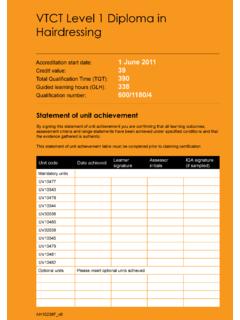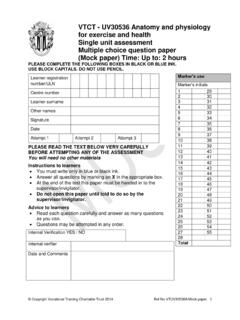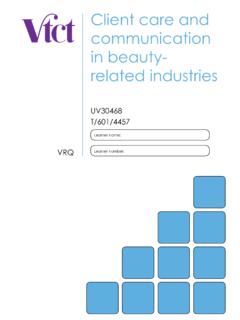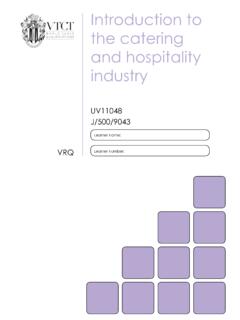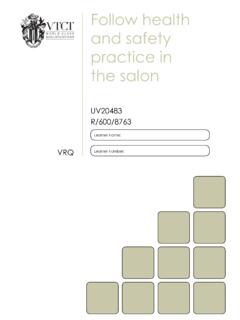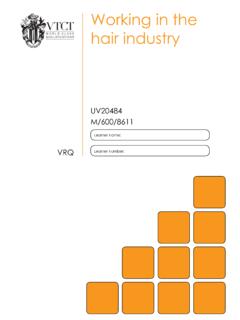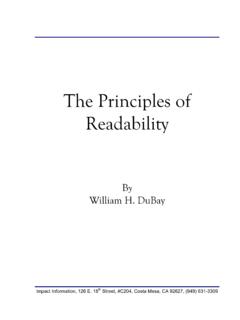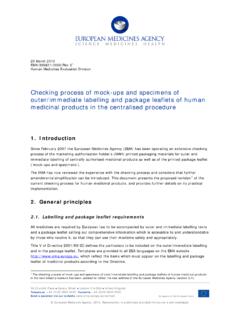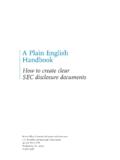Transcription of Theories, principles and models in education and training
1 Learner name:Learner number:A/505/0818 VRQUET6 Theories, principles and models in education and trainingBy signing this statement of unit achievement you are confirming that all learning outcomes, assessment criteria and range statements have been achieved under specified conditions and that the evidence gathered is statement of unit achievement table must be completed prior to claiming certification. Unit codeDate achievedLearner signatureAssessor initialsIV signature (if sampled)Assessor nameAssessor signatureAssessors initialsAssessor number (optional)Assessor tracking tableStatement of unit achievementAll assessors using this Record of Assessment book must complete this table. This is required for verification is the specialist awarding organisation for the Hairdressing, Beauty Therapy, Complementary Therapy, Hospitality and Catering and Sport and Active Leisure sectors, with over 45 years of is an awarding body regulated by national organisations including Ofqual, SQA, DfES and is a registered charity investing in education and skills but also giving to good causes in the area of facial disfigurement.
2 UET6 Theories, principles and models in education and trainingThe aim of this unit is to provide you with the knowledge and understanding of theories, principles and models applied to education and training . You will learn about the application of theories, principles and models of learning, communication and assessment in education and training . You will also cover the application of theories and models of curriculum development within your own area of specialism, and the application of theories and models of reflection and evaluation of your own valueLevel Observation(s)External paper(s)6020500On completion of this unit you will:Learning outcomesTheories, principles and models in education and training1. Understand the application of theories, principles and models of learning in education and training2.
3 Understand the application of theories, principles and models of communication in education and training3. Understand the application of theories, principles and models of assessment in education and training4. Understand the application of theories and models of curriculum development within own area of specialism5. Understand the application of theories and models of reflection and evaluation to reviewing own practice1. Achieving assessment criteria There must be valid, authentic and sufficient evidence for all assessment criteria. Holistic assessment is encouraged and one piece of evidence may be used to meet the requirements of more than one assessment Knowledge outcomes There must be evidence that you possess all the knowledge and understanding listed in the Knowledge section of this unit.
4 In most cases this can be done by professional discussion and/or oral questioning. Other methods, such as projects, assignments and/or reflective accounts may also be used. 3. Tutor/Assessor guidance You will be guided by your tutor/assessor on how to achieve learning outcomes a in this unit. All outcomes must be achieved. 4. Prerequisite This unit is a prerequisite for the Level 5 unit UET4 Developing teaching, learning and assessment in education and External paper There is no external paper requirement for this unit. UET63 Evidence requirementsAchieving knowledge outcomesDeveloping knowledgeYou will be guided by your tutor and assessor on the evidence that needs to be produced. Your knowledge and understanding will be assessed using the assessment methods listed below*: Projects Observed work Witness statements Audio-visual media Evidence of prior learning or attainment Written questions Oral questions Assignments Case studies Professional discussionWhere applicable your assessor will integrate knowledge outcomes into practical observations through professional discussion and/or oral questioning.
5 When a criterion has been orally questioned and achieved, your assessor will record this evidence in written form or by other appropriate means. There is no need for you to produce additional evidence as this criterion has already been knowledge and understanding outcomes may require you to show that you know and understand how to do something. If you have practical evidence from your own work that meets knowledge criteria, then there is no requirement for you to be questioned again on the same topic.*This is not an exhaustive outcome 1 Understand the application of theories, principles and models of learning in education and trainingYou can:Portfolio reference a. Analyse theories, principles and models of learningb. Explain ways in which theories, principles and models of learning can be applied to teaching, learning and assessmentc.
6 Analyse models of learning preferencesd. Explain how identifying and taking account of learners individual learning preferences enables inclusive teaching, learning and assessmentUET65 Learning outcome 2 Understand the application of theories, principles and models of communication in education and trainingYou can:Portfolio referencea. Analyse theories, principles and models of communicationb. Explain ways in which theories, principles and models of communication can be applied to teaching, learning and assessment UET66 Learning outcome 3 Understand the application of theories, principles and models of assessment in education and trainingYou can:Portfolio referencea. Analyse theories, principles and models of assessmentb. Explain ways in which theories, principles and models of assessment can be applied in assessing learning UET67 Learning outcome 4 Understand the application of theories and models of curriculum development within own area of specialismYou can:Portfolio referencea.
7 Analyse theories and models of curriculum developmentb. Explain ways in which theories and models of curriculum development can be applied in developing curricula in own area of specialism UET68 Learning outcome 5 Understand the application of theories and models of reflection and evaluation to reviewing own practiceYou can:Portfolio referencea. Analyse theories and models of reflection and evaluationb. Explain ways in which theories and models of reflection and evaluation can be applied to reviewing own practice UET69 Learning outcome 1: Understand the application of theories, principles and models of learning in education and trainingUnit contentThis section provides guidance on the recommended knowledge and skills required to enable you to achieve each of the learning outcomes in this unit.
8 Your tutor/assessor will ensure you have the opportunity to cover all of the unit , principles and models of learning: Learning theory (andragogy, behaviourism, cognitivism, humanism, socially situated learning), motivation theory ( Maslow, Herzberg, McGregor), learning domains, Bloom s taxonomy, assessment theory, different types of assessment ( initial, formative, summative), different methods of assessment ( observation, oral questioning, written questions, practical exercises), reflective practice theory, models of reflection ( Gibbs, Schon, Rolfe, Brookfield).Ways theories, principles and models can be applied to teaching, learning and assessment: Learning preferences, different teaching and learning methods to accommodate different learners and different abilities or needs ( one-to-one, paired work, small group teaching, whole group learning), communication theory, written, verbal and non-verbal communication, inclusive language, lesson planning, differentiation, classroom management, applying organisational policies and procedures, demonstrating use of appropriate resources, strengths and limitations of specific resources, representation of cultural differences, avoiding stereotyping, adapting resources to accommodate specific learning difficulties and of learning preferences.
9 Kolb, Honey & Mumford, VAK (VARK Visual, Auditory, Reading, Kinasthetic).Identifying and taking account of learners individual preferences: Learning preferences, different teaching and learning methods to accommodate different learners and different abilities or needs ( one-to-one, paired work, small group teaching, whole group learning), communication theory, written, verbal and non-verbal communication, inclusive language, lesson planning, differentiation, classroom management, applying organisational policies and procedures, demonstrating use of appropriate resources, strengths and limitations of specific resources, representation of cultural differences, avoiding stereotyping, adapting resources to accommodate specific learning difficulties and outcome 2: Understand the application of theories, principles and models of communication in education and trainingUET611 Theories, principles and models of communication: Transactional analysis, interactive, linear, institutional, social, cultural and personal barriers to theories, principles and models of communication can be applied: Lesson planning, Blooms Taxonomy of Learning (categorisation of objectives, knowledge, comprehension, application, analysis, synthesis, evaluation), differentiated outcomes, embedding language, literacy, numeracy (LLN), adult core curriculum, communication theory, written, verbal and non-verbal communication, inclusive language, readability (FOG and SMOG index), reading age, listening skills, questioning technique.
10 Learning outcome 3: Understand the application of theories, principles and models of assessment in education and trainingTheories, principles and models of assessment: Different stages of assessment (screening, initial, diagnostic, formative, summative), different forms of assessment (self, peer, ipsative, criterion referenced, normative referenced), assessment of learning, assessment as learning, assessment for learning, different methods of assessment (computerised, group work, practical observation, presentations, question and answer, test, role play, witness testimony), formal and informal assessment, validity, reliability, adaptation of assessment arrangements to meet the needs of individual theories, principles and models of assessment can be applied: The learning journey and its relationship to the assessment cycle, assessment planning involving the learner, different stages of assessment (screening, initial assessment, diagnostic assessment, formative, summative), different forms of assessment (self, peer, ipsative, criterion referenced, norm-referenced, assessment for learning, assessment as learning, assessment of learning), different methods of assessment ( observation, oral questioning, written questions, project based assignments, examinations, product evidence), formal and informal, paper based and non-paper based, awarding organisation requirements, considering issues that impact upon selection of assessment methods (validity, reliability, fairness, sufficiency, currency, authenticity)
